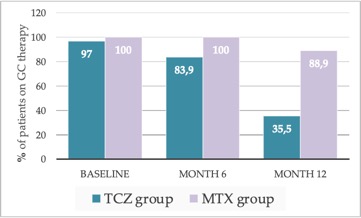Session Information
Date: Tuesday, November 14, 2023
Title: (2387–2424) Vasculitis – Non-ANCA-Associated & Related Disorders Poster III
Session Type: Poster Session C
Session Time: 9:00AM-11:00AM
Background/Purpose: Glucocorticoids (GCs) are still the mainstay of treatment of Giant Cell Arteritis (GCA). Although GCs are highly effective in GCA, it is well documented the high burden of toxicity of GCs as well as the disease relapse during GC tapering. Therefore, patients with GCA may benefit from GC-sparing treatments. The aim of this retrospective study was to compare the efficacy and rapidity of TCZ and MTX as steroid-sparing agents in a real-life cohort of GCA patients.
Methods: A retrospective analysis was conducted including patients with newly diagnosed GCA from the Rheumatology Units of Udine and Rome. The diagnosis of GCA was based on the presence of symptoms and signs and confirmed by temporal artery biopsy, temporal artery ultrasound, or PET/CT imaging. The inclusion criterion was the treatment with TCZ or MTX as first steroid-sparing drug.
Results: 112 GCA patients (81 female) with a median age of 70 (IQ 65-75) years were collected. Thirty-one out of 112 (27.7%) patients were treated with TCZ (162mg/week), while 81/112 (72.3%) patients received MTX (up to 20mg/week) as a GC-sparing agent.
The median time of follow up in the TCZ and MTX group was 28 (18.5-44) and 67 (42-99) months (p < 0.001), respectively. At the last medical examination, 110/112 (98.2%) patients were in sustained remission, and 25/31 (80.6%) patients in TCZ group and 60/81 (74.1%) patients in MTX group were on steroid-free therapy.
At month 6 after GCA onset, 5/31 (16.1%) patients in TCZ group and none in MTX group were in GC-free sustained remission (p-value=0.001). Similarly, at month 12, 64.5% (20/31) and 11.1% (9/81) of patients were in sustained GC-free remission in TCZ and MTX group, respectively (p-value < 0.001). The median time to discontinued GCs was 10 (IQR 7-12) months (TCZ group) and 24 (IQR 18-45) months (MTX group) (p-value < 0.001).
During the follow up period, at least one relapse of the disease occurred in 7/31 (22.6%) in TCZ-treated and 43/81 (53.8%) in MTX-treated patients, respectively (p-value=0.003).
The number of overall complications (including infectious events, new-onset of hypertension, new-onset diabetes mellitus, fragility fractures, secondary osteoporosis, ischemic events and malignancies) was not statistically different between the two groups over the follow up, even if a trend towards a lower incidence of secondary osteoporosis was recorded, and the total number of adverse events under TCZ was numerically lower than on MTX (p-value=0.086).
Conclusion: TCZ allowed a faster discontinuation of steroid therapy and a lower relapse rate than MTX in GCA patients.
To cite this abstract in AMA style:
Quartuccio L, Treppo E, De Martino M, Pillon M, Perniola S, Bruno D, Isola M, Gremese E. Tocilizumab versus Methotrexate in Giant Cell Arteritis: A Retrospective Study to Compare Efficacy and Rapidity of These Steroid-sparing Agents in GCA Patients [abstract]. Arthritis Rheumatol. 2023; 75 (suppl 9). https://acrabstracts.org/abstract/tocilizumab-versus-methotrexate-in-giant-cell-arteritis-a-retrospective-study-to-compare-efficacy-and-rapidity-of-these-steroid-sparing-agents-in-gca-patients/. Accessed .« Back to ACR Convergence 2023
ACR Meeting Abstracts - https://acrabstracts.org/abstract/tocilizumab-versus-methotrexate-in-giant-cell-arteritis-a-retrospective-study-to-compare-efficacy-and-rapidity-of-these-steroid-sparing-agents-in-gca-patients/

